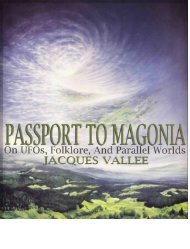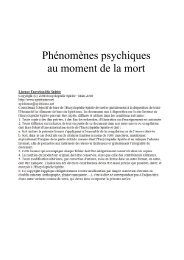extraordinary%20encounters
extraordinary%20encounters
extraordinary%20encounters
Create successful ePaper yourself
Turn your PDF publications into a flip-book with our unique Google optimized e-Paper software.
cupancy of the bodies of grown adults, so as<br />
not to waste valuable time.<br />
Nyman writes, “We strongly suspect that<br />
the feeling of dual reference . . . is unconsciously<br />
present in all [abduction] experiencers”<br />
(Nyman, 1989). Most investigators of<br />
the abduction phenomenon disagree, and indeed<br />
when Nyman presented his ideas at a<br />
1992 conference held at the Massachusetts Institute<br />
of Technology, some questioners accused<br />
him of leading his subjects into confabulation.<br />
They were particularly critical of his<br />
practice of asking the subjects to recall “memories”<br />
of their lives in the womb. Among<br />
Nyman’s defenders was Harvard University<br />
psychologist John E. Mack, who was also engaged<br />
in extensive hypnotic probing of ostensible<br />
abductees.<br />
In a book published two years later, Ma c k<br />
told the story of a young man he identifies<br />
only as Paul, “one of an increasing group of<br />
a b d u c t e e s . . . who have discove red that they<br />
h a ve a dual identity of an alien (they do not<br />
use that word) and a human being.” Pa u l<br />
was convinced that he was on Earth to show<br />
people how to love and accept love — t h i s<br />
e ven before he found his alien identity<br />
under hypnosis.<br />
Paul had gone to another psychologist to<br />
examine some of his life’s problems, including<br />
a conviction that he had seen a weird humanoid<br />
creature. Hypnotized, he spoke of<br />
other encounters with other strange beings,<br />
including one when he was two or three years<br />
old. The psychologist did not know what to<br />
make of these stories, and he and Paul parted<br />
company; Paul eventually found his way to<br />
Mack.<br />
With Mack, Paul explored an apparent<br />
memory of a further encounter, this one when<br />
he was six and a half. He spoke of seeing a<br />
being inside his house and of sensing that the<br />
two of them were “linked in a way.” They<br />
went outside together, where they met two<br />
groups—four or five each—of humanoids.<br />
Though they did not look human, Paul felt<br />
comfortable, even joyful, to be in their company.<br />
They apparently felt the same; they<br />
Dual reference 89<br />
hugged him and gave every indication of feeling<br />
great affection for him. The whole experience<br />
felt “like home.” Subsequently he was<br />
taken aboard a ship, an experience he sensed<br />
he had undergone in other lives. One of the<br />
beings told him that he was from their planet.<br />
The alien spoke of human beings’ inability to<br />
“truly open up to another” and of their hostility<br />
to the visiting extraterrestrials.<br />
During the session Paul alternated between<br />
his human and alien selves. In the latter, he<br />
spoke of the nature of higher consciousness<br />
and of humans’ destructive ways. He also expressed<br />
homesickness for the ship and the<br />
planet from which he had come. He “remembered”<br />
earlier visits to Earth, including interactions—apparently<br />
tens of millions of years<br />
ago—with intelligent, gentle dinosaurs. In another<br />
instance, the ship on which he was traveling—in<br />
earthling guise—with extraterrestrial<br />
companions rescued the surviving<br />
occupants of a crashed craft that went down<br />
in the desert after being shot down by “men in<br />
uniforms.” Two of the crew died and had to<br />
be abandoned in the face of advancing soldiers.<br />
Paul felt, in this instance, ashamed to be<br />
human; yet, in a broader context, he felt certain<br />
that “peace and love” were slowly spreading<br />
over the Earth and that he had a role to<br />
play in opening up human beings to larger,<br />
benevolent cosmic truths.<br />
According to Mack, Paul has learned powerful<br />
psychic healing powers from his ongoing<br />
interactions with his extraterrestrial friends.<br />
He has been given a great deal of information<br />
on their “unbelievable” technology but has<br />
been forbidden to share it (Mack, 1994a).<br />
Mack rejects the theory that such attachments<br />
of abductee to abductor are analogous<br />
to the so-called Stockholm Syndrome, in<br />
which a hostage comes to identify with his or<br />
her captor. There is, he says, “little sense that<br />
the alien identity is primarily a product of<br />
‘identification with the aggressor.’ . . . Rather,<br />
the dual identity appears to be a fundamental<br />
dimension of the consciousness expansion or<br />
opening that is an intrinsic aspect of the abduction<br />
phenomenon itself” (Mack, 1994b).





